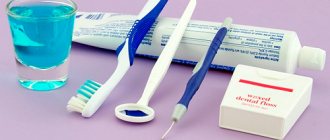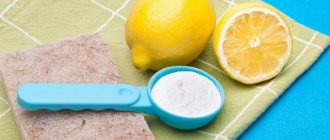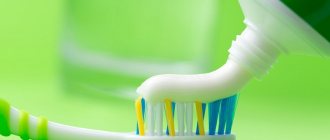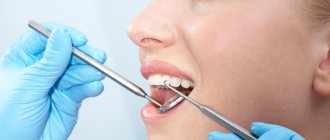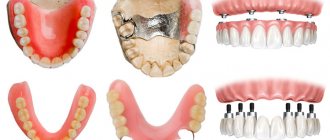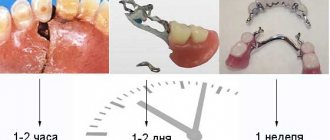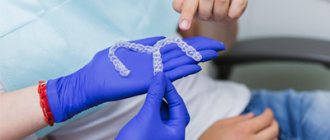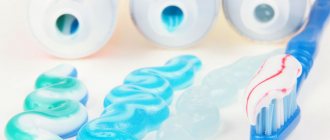Removable dentures are often the only option for people with large missing teeth. Lack of teeth is not only a huge aesthetic defect, but is also fraught with serious health problems (malocclusion, unclear diction, facial asymmetry, gum atrophy, disturbances in the functioning of the stomach). Modern removable plates help restore all dental functions and allow you to return to your normal lifestyle. However, one of the common complaints when using dentures is that they rub the soft tissues of the oral cavity. Dentures are rubbing, what should I do? Let's try to figure it out and give advice in this article.
Possible causes of discomfort
- rehabilitation period: the process of getting used to removable devices is not easy. For some people, the sensation of a foreign body in the mouth persists for 1-2 months, while others cannot get rid of it throughout the entire period of use. Moreover, the more teeth were missing at the time of prosthetics, the more discomfort the patient may feel, because the bite has been disturbed for a long time, and it is quite natural that the restored normal position of the jaws initially causes discomfort,
- the bulky base of the product and the presence of a massive palatal overlap: almost all removable devices have these disadvantages. On the one hand, such design features allow the devices to fit well in the mouth. On the other hand, they cause significant inconvenience, pressure, rubbing,
- an incorrectly or poorly manufactured structure that does not correspond to the individual anatomical characteristics of the patient,
- inflammation of the mucous membranes of the oral cavity and gums: often people who wear removable systems develop denture stomatitis, gingivitis and periodontitis,
- atrophy of bone tissue and uneven relief of the alveolar ridge: inevitably occurs during the operation of any removable systems,
- poor oral hygiene and insufficient care of the removable structure: simply, if you haven’t cleaned your mouth after eating, irritation is caused by crumbs stuck in the gaps,
- eating tough and hard foods: unfortunately, when wearing removable systems, the patient must constantly observe dietary restrictions, otherwise the devices may become deformed, cause pain and chafing,
- long service life of the system: after a certain time, any, even the most high-quality removable denture needs correction and relining,
- the patient’s psychological unpreparedness to wear removable systems: psychologists and researchers highlight such a factor as “rejection” of structures even despite their full compliance with the requirements1,
- breakdown of the device, appearance of cracks and chips on the prosthesis base,
- an allergic reaction to the materials from which the product was made: most often occurs to metal fastening elements, acrylic, nylon. Then the discomfort is accompanied by a burning sensation, itching.
The cause of the problem may be a bulky denture.
Read the article on the topic: 4 points to pay attention to when choosing removable dentures.
Now we will present you with tips that can help alleviate the situation somewhat.
Prevention measures
Inflammation of the gums is a very unpleasant phenomenon that can lead to serious complications. To minimize the risk of its development, after installation of the prosthesis, the patient must follow certain rules.
Prevention measures are:
- Careful oral hygiene .
Teeth should be brushed at least twice a day, paying special attention to hard-to-reach areas. It is also useful to rinse your mouth after every meal. For these purposes, regular toothpaste and a brush are suitable, but other specialized products can also be used. Removing food debris will reduce the risk of developing caries and periodontitis. - Remove the prosthesis at night. During sleep, the gums will be able to rest from the structure. The prosthesis must be placed in a special solution that will help maintain its functionality and appearance.
- Massage your gums with your fingers every day. This effect helps improve blood circulation, resulting in reduced pain and swelling of the gums.
- For additional care, use herbal decoctions or infusions.
- Visit the dentist periodically (at least 2 times a year).
Recommendation #1. Use products from the pharmacy
If you are not ready to see a doctor right away or cannot do this for objective reasons, then try to solve the problem with the help of various medications:
- medicinal and anti-inflammatory gels (“Cholisal”, “Solcoseryl”): the products help relieve the inflammatory process, relieve pain, promote rapid regeneration of damaged tissues, disinfect and prevent pathogenic bacteria from entering the mucous membrane,
Ointment can be used to relieve symptoms - self-absorbable collagen plates for gums (for example, “Farmadont”): contain sage, rose hips, chamomile. They have antiseptic, cooling, regenerating, soothing properties. They can be used in the complex treatment of stomatitis, gingivitis and periodontitis,
- pads (“Protefix”) and fixing creams (“Korega”, “President”): improve the quality of fixation of the prosthesis in the oral cavity, due to which it stops moving and rubbing. They create an airtight layer, so pieces of food do not get clogged between the structure and the gum, which again contribute to irritation of delicate tissues,
For better fixation of the prosthesis, you can use special fixing creams. - rosehip and sea buckthorn oils: have a calming and regenerating effect,
- rinsing with drugs such as Miramistin, Chlorhexidine, chamomile and sage: have an antiseptic effect, prevent the development of the infectious process, help reduce sensitivity, activate local immunity, and start the process of tissue regeneration.
“I rubbed my gums with a prosthesis and didn’t know how to treat it. I went online and honestly, gentlemen, I was horrified. Some craftsmen seriously suggest using a file or sandpaper to adjust or grind down artificial material. I'm shocked! This is some kind of last century, so you can completely damage the prosthesis, and even seriously injure your gums with this homemade sawed product!!!”
Natali, fragment of a review from the dental portal gidpozubam.ru
The listed means are good for protecting the mucous membrane both during the process of adaptation to a removable structure, and after habituation. They will help relieve unpleasant symptoms until you see an orthopedist and receive qualified help. They can also be used after consulting a doctor.
Pharmacy medications will bring significant relief if the prosthesis was really well made and does not yet need correction. Otherwise, medicinal ointments and pads will have a temporary and very short-lived effect.
How to get rid of pain
It is important not to take independent action. Treatment of gum inflammation from dentures is carried out by a dentist, who first of all conducts an examination, identifies the cause of the pathology, and only then prescribes therapy and answers the question “how to treat.”
To cure the inflammatory process and eliminate pain caused by improper installation of the structure, correction of the prosthesis is undertaken. If the cause of the pathology is an allergic reaction to metal and its alloys, then there is only one way out - the manufacture and installation of a metal-free structure made of zirconium dioxide.
In a clinical setting, specialists treat and irrigate gums for regeneration and remove necrotizing tissue.
At home, patients use:
- Medications. The use of antibiotics and painkillers is prescribed by the dentist only if the gums under the dentures hurt as a result of complications.
- The most popular use of rinses, creams, gels and ointments, balms with anti-inflammatory, antimicrobial and antiseptic effects. The following popular brands accelerate the healing of gums - “Metragil-Denta”, “Miramistin”, “Cholisal”, “Forest Balsam”, “Malavit”, “Chlorhexidine”. Regular use and surface treatment helps relieve unpleasant symptoms and destroy bacteria accumulating under the structure.
- The use of special toothpastes (“Lakolyut”, “President”, “Parodontax”) helps reduce bleeding gums and relieve inflammation. The medicinal paste is used for a month. It is impossible to treat the gums after this time. You can add a drop of tea tree oil to a pea-sized amount of product. This is a natural antiseptic that is actively used in dentistry.
The application of collagen plates and pads under removable dentures is recommended by the doctor in case of constant friction. They perform the function of protecting the mucous membrane and disinfecting the surface. The plates are applied three times a day to the mucous membrane.
Recommendation #2. Give the prosthesis for relining and correction
People planning to install removable dentures should understand that the structures periodically need correction and relocation to suit the characteristics of the jaw bone tissue and mucous membrane, which gradually atrophy, that is, decrease in volume.
If the device has just been manufactured and fixed, then in the first months about ten corrections may be required. Moreover, the fewer teeth you had at the time of prosthetics, the more visits you will have to make to the clinic. You need to understand that the bite has been broken for a long time, so even the most well-designed prosthesis can cause discomfort at first.
Relining the prosthesis can help reduce discomfort.
After getting used to and normalizing the bite relationship, we also shouldn’t forget about corrections. They need to be done approximately once every 6-12 months. Otherwise, the structures will begin to shift, rub, and fall out of the mouth.
Does the prosthesis press and rub? Make an appointment with a doctor, but before visiting the dentist, try to walk with a removable device for at least 3-4 hours, so that the orthopedist can use the mark left on the soft tissues to assess which area should be given special attention and what adjustments need to be made according to the situation.
Preventive measures to strengthen gums
With age, the mucous membrane in the oral cavity loses its elasticity. To prevent swelling, it is necessary to strengthen the gums. Proper hygiene includes more than just daily brushing with a quality toothpaste. Dentists recommend using special irrigators that wash away plaque from the interdental spaces.
Preventing chafing
Your doctor can give you tips on how to prevent chafing:
- You should not save on making a prosthesis by choosing only a trusted clinic;
- strictly follow the rules for maintaining the structure;
- do not repair breakages and cracks yourself, so as not to disturb the basis;
- regularly visit the dentist for preventive examinations;
- Use solid foods with caution.
Recommendation #3. Exchange your old denture for a new one
If, after examination by a doctor, it turns out that the product cannot be adjusted or repaired, it will have to be replaced to avoid discomfort and chafing. But remember that when the doctor installs a new structure, during the period of getting used to it, it is important to pay attention to the slightest inconvenience and report them to the orthopedist so that he can make timely adjustments and adjust the new teeth to your individual characteristics.
We list the cases in which it may be necessary to manufacture a new device:
- an allergic reaction to the materials of the old prosthesis occurred,
- the structure has become deformed, broken, or irretrievably lost its visual appeal due to poor-quality hygienic care or its complete absence,
- the clinical situation in the oral cavity has changed: for example, the patient wore a partially removable device, but his teeth, which acted as supporting teeth, collapsed or fell out,
- The service life of the system and the materials used to create it have expired: the service life of removable devices is very short. The best of them, for example, Acry-Free, clasps and Quattro Ti can last up to 5-7 years, and nylon and acrylic ones must be replaced after 2-5 years.
If the structure breaks down, you should replace it with a new one.
It is very important that at the stage of preparation for prosthetics, the specialists of the clinic where you contacted carry out a comprehensive comprehensive diagnosis of the condition of the maxillofacial apparatus. Doctors of the most innovative dentistry today use mainly digital equipment and software in their work, which allows them to identify all functional disorders of the umbilical nervous system and create a truly comfortable prosthesis that will help correct all defects.
Reviews
Inflammation of the oral mucosa can occur for various reasons. It is important to contact a specialist as early as possible and not self-medicate.
In the comments to this article, we invite you to share useful tips on how to avoid the development of inflammation between the gum and the denture or suggest effective treatment methods.
If you find an error, please select a piece of text and press Ctrl+Enter.
Tags prosthetics removable dentures
Did you like the article? stay tuned
Previous article
Endoscopic dental implantation – restoration of the integrity of the dentition without cuts and blood
Next article
Is it possible to smoke while correcting the bite with braces?
Recommendation #4. Get dental implantation, that is, change your removable denture to a better solution
If you are tired of many uncomfortable moments (and this is not only rubbing of the mucous membranes, but also impaired diction, the inability to eat your favorite foods, the gag reflex, and others) that arise when using removable devices, then it’s time to move to a fundamentally new and higher quality level of life.
Typically, removable systems are worn by people with multiple and complete edentia (when there are no teeth at all). For such patients, the best and most correct solution is to replace removable devices with non-removable ones, fixed on analogues of the roots of natural teeth - implants. And one-stage implantation with immediate loading will help achieve this goal.
When implanted with immediate loading, the prosthesis is installed within 3 days
This approach is good because the patient receives a permanent and fully functional prosthesis, which is securely fixed in the oral cavity already 2-3 days after the implantation of artificial roots. One-stage implantation protocols make it possible to do without bone grafting and without mucosal grafting, and these manipulations in most cases are necessary for those who have used removable dentures for a long time.
Fixed structures, which are fixed to implants according to one-stage treatment protocols, have a beautiful gingival contour, as well as a metal base that stabilizes and unites the entire system into a single whole. Due to this, already during the rehabilitation period the patient begins to eat his favorite foods, smiles freely, and does not worry that the structures will fall out or rub the mucous membrane.
Methods of therapy
Regardless of the symptoms, a treatment plan for the inflammatory process on the gums should be drawn up by a doctor. After examining the oral cavity and identifying the cause of inflammation, the specialist prescribes the most effective remedies.
Pharmacy solutions for rinsing
The most popular means are:
- Miramistin is an antiseptic for topical use.
The main active ingredient is benzyldimethyl-myristoylamino-propylammonium chloride monohydrate. The drug has a broad bactericidal, antifungal and antiviral effect. When shaken, the solution forms a thick foam. For inflammation of the gums, rinse the mouth 3-4 times a day. The course of treatment is 1-2 weeks. - Chlorhexidine is a topical treatment agent with anti-inflammatory and antibacterial effects.
The active substance in the drug is chlorhexidine bigluconate. Chlorhexidine is used as a mouth rinse 3 times a day until complete recovery. - Furacilin is a drug with a pronounced antibacterial and anti-inflammatory effect.
Available in the form of tablets for preparing a solution. The main active ingredient is nitrofural. The tablets are diluted with water in a ratio of 4 tablets per 1 liter of water. Rinse the mouth with the prepared solution up to 5 times a day. - Stomatophyte – a preparation intended specifically for treating the oral cavity. It has a deodorizing, anti-inflammatory and regenerating effect.
Available in the form of a concentrated solution. The product contains extracts of medicinal herbs - chamomile, sage, calamus, oak bark, arnica, mint and thyme.Before use, the product must be diluted in a proportion of 10 ml per ¼ glass of water. Rinsing is carried out 3-4 times a day for 2 weeks.
- Forest balm is a mouth rinse containing tea tree oil.
Thanks to it, the balm actively strengthens the gums, relieves inflammation and improves blood circulation. You should rinse your mouth with the drug after every meal or brushing your teeth. The kit includes a special measuring cup. - Malavit is a homeopathic remedy that has a decongestant, analgesic and deodorizing effect. Used as an additional treatment for infectious diseases. Dilute 10 ml of the drug in a glass of water and rinse your mouth once a day.
What are the most popular prosthetic options in the absence of a large number of teeth, according to reviews from patients and specialists?
In this publication we will talk about how to choose a container for storing dentures.
Here https://www.vash-dentist.ru/protezirovanie/semnyie-p/chto-nuzhno-znat-pensioneram-zubov.html you will find all the most important things about preferential dental prosthetics for pensioners.
Gels and ointments
The following topical preparations have proven effective:
- Cholisal is a gel with a combined effect.
It has an anti-inflammatory and antimicrobial effect, quickly relieves pain. The effect of the drug begins within a couple of minutes after application to the gums. The composition includes two active substances - choline salicylate and cetalkonium chloride. Cholisal is available in the form of a transparent gel, which is applied to the affected areas of the oral mucosa 2-3 times a day before or after meals. - Metrogyl denta is a drug with a pronounced anti-inflammatory effect.
It contains metronidazole and chlorhexidine. The use of this gel helps relieve pain and eliminate unpleasant symptoms such as itching and burning. Metrogyl denta is applied to areas of gum inflammation after preliminary cleaning of the oral cavity twice a day. - Solcoseryl - dental paste has an active regenerating effect.
Thanks to dialysate from the blood of dairy calves, the drug improves metabolic processes in tissue cells, and polidocanol helps relieve pain. After application to a clean oral mucosa, the paste forms a protective film that protects the gums from mechanical damage for 3-5 hours. The product is used up to 5 times a day until complete recovery. - Kamistad is another drug with a combined effect.
Lidocaine relieves pain, and chamomile eliminates inflammation, disinfects and accelerates tissue healing. The gel is squeezed onto your finger in the form of a strip 0.5 cm long and rubbed into the affected areas of the gums. The course of treatment depends on the severity of the inflammation and lasts until complete recovery. - Asepta is a drug prescribed for infectious and inflammatory processes in the oral cavity.
It contains metronidazole, chlorhexidine, propolis and vitamin supplements. This gel relieves inflammation, reduces pain and itching, and also accelerates wound healing by improving metabolic processes in tissues. The drug is applied after brushing the teeth to the affected areas 2-3 times a day for 1-2 weeks. - Parodontocide is a herbal antiseptic. Its composition includes essential oils of sage, mint and cloves, as well as phenyl acylate. The use of the gel helps reduce gum inflammation, relieve pain, destroy germs and bacteria, and freshen breath.
ethnoscience
In folk medicine there are the following recipes:
- Aloe is a natural antiseptic. A freshly cut and peeled leaf of the plant is applied to the affected area for 5-10 minutes or overnight. Duration of use - until complete recovery.
- Chamomile relieves inflammation well. To prepare the infusion, take 1 tablespoon of dried flowers and pour a glass of boiling water. After cooling, the infusion is filtered and used for oral baths - put in the mouth and keep for half an hour. The course of application lasts until the wounds heal.
- Oak bark is used to rinse the mouth. To prepare the decoction, take 20 g of dry bark and pour a glass of boiling water. Leave for 1 hour. After this, filter and rinse your mouth 2-3 times a day.
- A rinse solution is made from soda and salt 1 tsp. Both ingredients are added to a glass of warm water and used after each meal. This solution helps reduce inflammation and cleanse the oral mucosa of harmful bacteria and germs.
Any medicine must be selected by the attending physician. Only an experienced specialist can determine which drug will be more effective in a particular case. Self-treatment can aggravate the condition and cause complications.
The video provides additional information on the topic of the article.
Symptoms for which you need to see a doctor
If you have just recently restored your teeth, and the dentures are rubbing the mucous membrane, then what should you do? There is no need to worry right away, because the soft tissues of the oral cavity need time to adapt and get used to the foreign object. For this reason, doctors do not even recommend removing the structure in the first days and nights (for at least 2 weeks). If you understand that the pain is getting worse, your gums are inflamed, and life with a prosthesis already seems unbearable, then it makes sense to consult a doctor.
You should be concerned if ulcers appear in your mouth
Read the article on the topic: 5 tips on how to get used to removable structures.
You should also be alert to other symptoms that indicate that you cannot do without the help of a professional:
- the prosthesis does not stay in the mouth at all, moves and falls out,
- a rash and ulcers appeared on the soft tissues of the oral cavity,
- salivation increased or, conversely, decreased, dryness appeared,
- itching, burning and pain of the mucous membrane,
- change in the shade of the mucous membrane from pale pink to red and bluish,
- the appearance of plaque and bad breath,
- bleeding gums,
- unpleasant sensations on the inside of the cheeks, lips,
- pain when closing the jaws and when chewing food.
In case of the unpleasant moments listed above, it is better to immediately consult a doctor who will conduct an examination, determine the exact cause of the problem and solve it at a professional level.
Notice
: Undefined variable: post_id in
/home/c/ch75405/public_html/wp-content/themes/UltraSmile/single-item.php
on line
45 Notice
: Undefined variable: full in
/home/c/ch75405/public_html/wp-content /themes/UltraSmile/single-item.php
on line
46
Rate this article:
( 3 ratings, average: 5.00 out of 5)
prosthetics
- Fastovets E.A., Glazunov A.O. The influence of the efficiency and quality of manufactured removable dentures on the standard of living of patients with complete absence of teeth // Modern dentistry. – 2021.
Expert “If a denture rubs, then patients begin to suspect the unprofessionalism of the doctors who created and installed it. But even well-made and perfectly fitted removable devices can cause problems over time - and it is important to understand this immediately, even BEFORE installing such a design. Discomfort occurs due to the fact that underneath them the bone tissue sags and decreases in volume along with the gums. As a result, the prosthesis no longer adheres evenly to the mucous membrane, does not hold well in the mouth, does not distribute the chewing load correctly, and this leads to pain, injury, and inflammatory processes.” Orthopedic dentist Vasin Yuri Aleksandrovich
Consulting specialist
Magadov Roman Vladimirovich
Doctor rating: 9 out of 10 (4) Specialization: Implant surgeon, orthopedist Experience: Notice
: A non well formed numeric value encountered in
/home/c/ch75405/public_html/wp-content/themes/UltraSmile/single-item.php
on line
158
2006 years
First aid
To relieve pain and alleviate the condition, the patient can use some tips:
- Mouth rinses with medicinal herbs. Decoctions have analgesic, sedative and anti-inflammatory effects.
- Pain relieving gels and ointments.
- Special pads between the denture and the gum.
- Gum massage improves blood supply to tissues and accelerates their regeneration.
- Painkillers for severe pain.
If pain persists for a long time, you should consult a doctor.
Comments
What happens if you continue to endure pain? My grandmother wears a removable denture and complains that it has been rubbing a lot lately, but we can’t find convincing arguments for her to finally go to the doctor...
Vera Anatolyevna (10.13.2020 at 21:15) Reply to comment
- Dear Vera Anatolyevna, if you do not take any measures to eliminate the problem, then very painful ulcers will form in the area of rubbing the mucous membrane, and an acute infectious-inflammatory process may also occur, which will gradually lead to necrosis, that is, the death of cells and tissues, osteomyelitis and phlegmon. Systematic tissue trauma can also become a prerequisite for the development of oral cancer.
Editorial staff of the portal UltraSmile.ru (10.15.2020 at 09:27) Reply to comment
How can you generally avoid such situations when the prosthesis begins to rub your gums?
Antipeev Yu.M. (10/31/2020 at 5:17 pm) Reply to comment
- Firstly, only undergo prosthetics from experienced orthopedists. Secondly, when using the prosthesis, follow these rules: after eating food, remove the prosthesis and clean it thoroughly, and rinse your mouth. If discomfort occurs and it does not go away for a long time, consult a doctor who will examine and correct the product. It’s even better if you visit a specialist every six months, undergo preventive examinations and professional hygiene, because artificial teeth require no less attention than natural teeth. And one more piece of advice: if you wear removable dentures, do not forget about dietary restrictions, refuse to eat hard, tough, viscous foods.
Editorial staff of the portal UltraSmile.ru (06.11.2020 at 09:38) Reply to comment
Hello! My dad recently received a removable denture. He says that everything is fine and suits him, like you need to get used to it. But at the same time, it hurts a little to close your jaw, and to eat too. Tell me, should this go away, or is there something wrong with the prosthesis?
Stanislav P. (11/20/2020 at 7:37 pm) Reply to comment
Good evening! Please tell me, are there any contraindications for installing a fixed prosthesis? Can a person develop an allergy to metal during such a procedure?
Anna Novikova (11/20/2020 at 7:39 pm) Reply to comment
Hello! My mother is 72 years old and had dentures installed last year. Everything was fine, but in September he flatly didn’t want to put on implants. He says they are rubbing it. They wanted to take her to the dentist, but now she has a migraine. Question: why did the dentures begin to rub only after almost a year?
Erica (11/20/2020 at 7:58 pm) Reply to comment
Only periodic adjustments will save you from chafing. Because the area of removable teeth can put pressure on the gum in some area. The only option is to cut it down. Then it will be a little easier.
Anton (11/20/2020 at 09:34 pm) Reply to comment
What can you do if after three months you still have discomfort from wearing removable dentures? Sometimes inflammation also appears. Is it possible that the design itself will have to be redone?
Inna (11/20/2020 at 9:46 pm) Reply to comment
Write your comment Cancel reply
What to do if your denture rubs
It’s not just the first days of installation that are difficult for many patients. Often, removable dentures constantly rub against the gums due to their irregular shape. In this case, therapeutic treatment will not be successful, so dentists carry out a correction or a complete change of the prosthesis.
The plate is filed at the points of contact with the mucous membrane. Thus, the load on the gums will be redistributed and the problem will be solved.
After the manipulations, the specialist recommends a remedy to relieve inflammation caused by rubbing. For example, a gel for lubricating gums. It is important to see a doctor immediately, otherwise complications are possible - inflammation of the inner layers of the jaw apparatus, healthy periodontal tissues.
Stock
-13%
Removable overdenture on 4 implants RUB 150,000.
130,000 rub.
get -37 %
Osstem dental implant and metal-ceramic crown RUB 63,000.
40,000 rub.
get -16 %
Premium implantation Nobel and zirconium dioxide crown 125,000 rub.
105,000 rub.
get -16 %
Premium implantation Nobel and zirconium dioxide crown 125,000 rub.
105,000 rub. get
Signs that your gums are inflamed
To prescribe correct and effective treatment for inflammation under the prosthesis, it is extremely important to correctly diagnose the cause. Below you can find out the main symptoms indicating an inflammatory process are as follows:
- Redness in the area where the gum comes into contact with the denture. The inflammatory process can spread quite quickly.
- Bleeding gums when brushing teeth or eating.
- Pain and discomfort while eating.
- Anti-inflammatory drugs do not help, or relieve redness for a short period.
- Bad breath may indicate inflammatory processes.
- Noticeable swelling of the gums.
